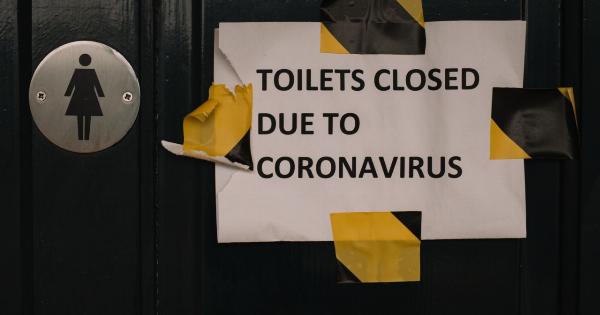The COVID-19 pandemic has brought about a great deal of stress and anxiety for people across the globe.
With the uncertainty surrounding the virus and its impact on our health, economy, and daily lives, it’s no wonder that many individuals are experiencing heightened levels of anxiety. Fortunately, there are various anxiolytic remedies available that can help you stay calm and manage your anxiety during this challenging time. In this article, we will explore 30 different anxiolytics that can provide you with the relief you need.
1. Deep Breathing Exercises
Deep breathing exercises are a simple yet effective way to calm your mind and body. By focusing on your breath and taking slow, deep inhalations and exhalations, you can activate your body’s relaxation response and reduce anxiety.
Practice deep breathing for a few minutes each day or whenever you feel overwhelmed.
2. Meditation
Meditation has long been recognized for its ability to promote relaxation and reduce stress. Find a quiet place, sit comfortably, and focus your attention on an object, word, or your breath.
Allow your thoughts to pass without judgment, bringing your focus back to the present moment whenever you find your mind wandering.
3. Yoga
Yoga combines physical movement, breathing exercises, and meditation to promote relaxation and reduce anxiety.
Even if you’re a beginner, there are plenty of beginner-friendly yoga routines available online that you can try in the comfort of your home.
4. Exercise
Engaging in regular physical exercise can help reduce anxiety by increasing the production of endorphins, which are natural mood boosters.
Whether it’s going for a run, dancing, or doing a home workout, find an exercise routine that you enjoy and make it a part of your daily routine.
5. Herbal Teas
There are several herbal teas known for their calming properties. Chamomile, lavender, and lemon balm teas can help promote relaxation and reduce anxiety. Brew yourself a cup of tea and take a few moments to sip and savor the warm, soothing drink.
6. Aromatherapy
Scents like lavender, bergamot, and chamomile have been shown to have a calming effect on the mind and body. Use essential oils or scented candles to create a calming ambiance in your living space.
7. Journaling
Writing down your thoughts and feelings can be a cathartic experience. Set aside a few minutes each day to jot down your worries, fears, and joys. This can help you gain a better understanding of your emotions and reduce anxiety.
8. Mindfulness
Mindfulness involves fully immersing yourself in the present moment and accepting it without judgment. Practice mindfulness by focusing on your senses—what you see, hear, smell, taste, and touch.
This can help anchor your mind in the present and alleviate anxiety.
9. Progressive Muscle Relaxation
Progressive muscle relaxation is a technique that involves tensing and then releasing each muscle group in your body, starting from your toes and working your way up to your head.
This exercise can help you become more aware of tension in your body and teach you how to relax those muscles.
10. Limit Media Consumption
Constant exposure to news and social media updates about the pandemic can heighten anxiety levels. Limit your media consumption to designated times during the day to stay informed without becoming overwhelmed.
11. Limit Caffeine Intake
Caffeine is a stimulant that can increase anxiety levels. Cut back on your consumption of coffee, tea, and energy drinks, especially in the afternoon and evening when it can interfere with sleep.
12. Spend Time in Nature
Nature has a calming effect on the mind and body. Take a walk in a park, garden, or any natural setting near you. Breathe in the fresh air, listen to the sounds of birds chirping, and allow yourself to relax and unwind in nature’s embrace.
13. Practice Gratitude
Cultivating a mindset of gratitude can help shift your focus from anxiety to the positive aspects of your life. Each day, write down three things you are grateful for.
This exercise can help rewire your brain to notice the good, even in challenging times.
14. Connect with Loved Ones
Social support is crucial during difficult times. Reach out to friends and family members through phone calls, video chats, or even handwritten letters. Share your feelings and concerns, and lean on one another for support.
15. Laugh
Laughter has a profound effect on reducing stress and anxiety. Watch a funny movie, read a humorous book, or engage in activities that make you laugh. Let laughter be your medicine.
16. Practice Self-Care
Engaging in self-care activities can help you relax and recharge. Take a bubble bath, practice skincare rituals, listen to soothing music, or indulge in hobbies that bring you joy.
17. Prioritize Sleep
Quality sleep is essential for managing anxiety. Establish a consistent sleep routine, create a sleep-friendly environment, and practice relaxation techniques before bedtime to promote a good night’s rest.
18. Cognitive Behavioral Therapy (CBT)
Cognitive-behavioral therapy is a form of therapy that helps individuals identify and change negative thought patterns and behaviors that contribute to anxiety. Consider seeking professional help from a therapist specializing in CBT.
19. Take Breaks
Give yourself permission to take breaks when you feel overwhelmed. Step away from work or daily responsibilities for a few minutes to engage in activities that help you relax and reset.
20. Practice Self-Compassion
Be kind to yourself during this challenging time. Acknowledge that it’s okay to feel anxious and remind yourself that you are doing the best you can.
Practice self-compassion by speaking to yourself with kindness and offering comfort in moments of distress.
21. Listen to Calming Music
Music has a powerful impact on our emotions. Create a playlist of calming and soothing music that can provide a sense of tranquility during anxious moments.
22. Create a Routine
Establishing a daily routine can bring structure and stability to your life, reducing feelings of uncertainty and anxiety. Create a schedule that includes regular mealtimes, work or study hours, leisure time, and relaxation breaks.
23. Learn Stress Management Techniques
There are various stress management techniques, such as biofeedback, guided imagery, and self-hypnosis. Explore these techniques to find the ones that resonate with you and incorporate them into your daily routine.
24. Set Realistic Goals
Feeling overwhelmed by an ever-growing to-do list can increase anxiety levels. Set realistic goals and prioritize tasks based on importance. Break larger tasks into smaller, more manageable steps.
25. Practice Grounding Techniques
Grounding techniques can help you redirect your focus from anxious thoughts to the present moment.
Examples include holding an ice cube, noticing five things you can see, four things you can touch, three things you can hear, two things you can smell, and one thing you can taste.
26. Seek Professional Help
If your anxiety becomes unmanageable or begins to interfere with your daily functioning, consider seeking professional help. A mental health professional can provide you with the tools and support you need to navigate through this challenging time.
27. Practice Acceptance
Acceptance involves acknowledging and embracing the uncertainties and challenges of the current situation without trying to change or fight against them.
Focusing on what is within your control can help alleviate anxiety related to things beyond your influence.
28. Get Creative
Engage in creative activities that allow you to express yourself, such as painting, drawing, writing, or playing a musical instrument. Channeling your emotions into artistic outlets can provide relief from anxiety.
29. Practice Mindful Eating
Pay attention to the taste, texture, and smell of your food. Eat slowly and savor each bite. Mindful eating can help shift your focus away from anxious thoughts and promote a sense of calm during mealtimes.
30. Remember the Power of Time
Lastly, remember that challenging times eventually pass. It can be helpful to remind yourself that this too shall pass. Focus on the present moment and have faith in your ability to navigate through uncertainties.






























